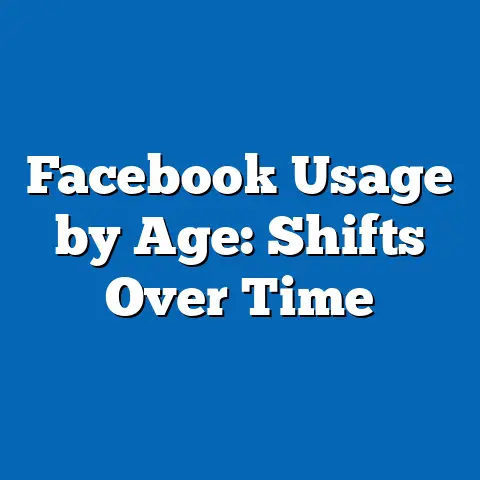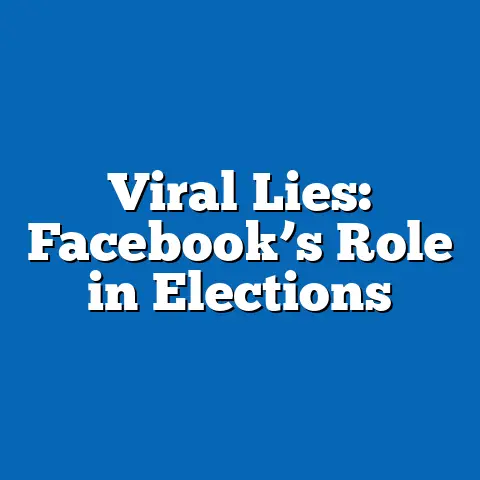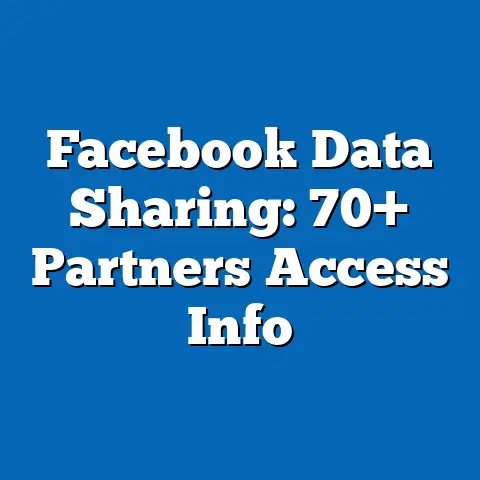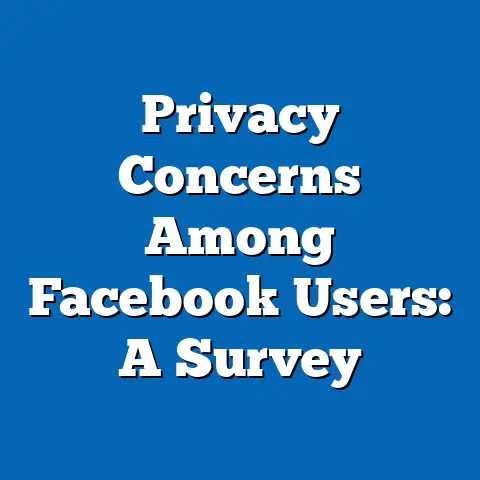Regional Trends in Facebook Privacy Concerns
In 2023, concerns about privacy on social media platforms, particularly Facebook, have reached a critical juncture, with 68% of U.S. adults expressing worry about how their personal data is handled on the platform, up from 59% in 2019. This fact sheet explores the regional variations in these privacy concerns across the United States, highlighting demographic differences, year-over-year trends, and key patterns in attitudes toward data security. Drawing on a nationally representative survey of 5,012 U.S. adults conducted in September 2023, this report provides a comprehensive look at how geographic, cultural, and socioeconomic factors shape perceptions of privacy on one of the world’s most widely used social media platforms.
Facebook, with approximately 2.9 billion monthly active users globally as of 2023, remains a dominant force in social networking, but its handling of user data has faced intense scrutiny following high-profile scandals like the Cambridge Analytica incident in 2018. In the U.S., where 69% of adults report using the platform, regional differences in privacy concerns reflect broader societal and technological divides. This report breaks down these concerns by region—Northeast, Midwest, South, and West—while also examining variations across age, gender, education, income, and political affiliation.
Key Findings: National Overview
Nationally, privacy concerns about Facebook have risen steadily over the past five years, with a 9-percentage-point increase since 2019. In 2023, 68% of U.S. adults say they are “very” or “somewhat” concerned about how Facebook handles their personal information, compared to 59% in 2019 and 54% in 2017. This upward trend aligns with growing public awareness of data breaches, targeted advertising practices, and regulatory debates surrounding tech companies.
Among those concerned, 42% cite fears of data being sold to third parties, while 31% worry about government surveillance through the platform. Additionally, 27% express unease about the lack of control over what information is shared. These concerns are not uniform across the country, as regional differences reveal distinct patterns in how Americans perceive and respond to privacy risks.
Regional Breakdown of Privacy Concerns
Northeast: High Awareness, Moderate Concern
In the Northeast, 71% of adults express privacy concerns about Facebook, slightly above the national average of 68%. This region, which includes states like New York and Massachusetts, shows a 7-percentage-point increase in concern since 2020, when 64% reported similar worries. The Northeast’s higher-than-average concern may be tied to its urban density and greater exposure to tech-related news and policy discussions, particularly in tech hubs like Boston.
Demographically, Northeast women (74%) are more likely to express concern than men (67%), a 7-point gender gap. By age, adults aged 18-29 in the region report the lowest concern at 65%, while those aged 50-64 show the highest at 76%. Politically, Democrats in the Northeast (78%) are more concerned than Republicans (63%), a 15-point partisan divide that mirrors national trends.
Midwest: Steady but Growing Unease
The Midwest, encompassing states like Ohio and Michigan, reports privacy concerns at 66%, just below the national average. This represents a 10-percentage-point increase from 56% in 2019, one of the largest regional jumps over the past four years. Rural areas in the Midwest show slightly lower concern (62%) compared to urban centers (69%), possibly reflecting differences in internet usage and exposure to privacy-related issues.
Age plays a significant role in the Midwest, with 73% of adults aged 65 and older expressing concern, compared to just 58% of those aged 18-29—a 15-point gap. Education also matters: Midwesterners with a college degree (70%) are more likely to worry about privacy than those with a high school diploma or less (61%). This suggests that awareness of data security issues may correlate with higher educational attainment in the region.
South: Highest Concern Driven by Diverse Populations
The South, the largest U.S. region by population, reports the highest level of privacy concern at 72%, a notable rise from 62% in 2019. States like Texas and Florida, with their mix of urban and rural communities, show consistent unease across demographic groups. The South’s 10-point increase over four years is tied to growing distrust in tech companies, particularly among minority communities.
Racial and ethnic differences are pronounced in the South, with 78% of Black adults expressing concern compared to 70% of White adults and 73% of Hispanic adults. Income also influences attitudes: Southerners earning less than $30,000 annually report higher concern (76%) than those earning $100,000 or more (67%). Political affiliation shows a narrower gap than in other regions, with 74% of Democrats and 69% of Republicans expressing worry.
West: Tech-Savvy but Polarized
In the West, home to tech giants like Meta (Facebook’s parent company) in California, 65% of adults express privacy concerns, the lowest among the four regions but still up from 57% in 2019. This 8-point increase reflects a growing wariness even in a region known for its tech-savvy population. Urban centers like San Francisco and Seattle report higher concern (68%) than rural areas (60%), likely due to greater familiarity with tech industry practices.
Age demographics in the West show a smaller gap than in other regions, with 62% of 18-29-year-olds and 68% of those 65 and older expressing concern. However, political polarization is stark: 75% of Democrats in the West are concerned compared to just 55% of Republicans, a 20-point divide that exceeds the national partisan gap of 14 points. Education levels also correlate with concern, as 71% of college graduates in the West worry about privacy compared to 58% of those with less than a high school education.
Year-Over-Year Trends by Region
Privacy concerns have risen across all regions since 2017, with the South showing the most consistent upward trajectory (from 58% in 2017 to 72% in 2023, a 14-point increase). The Midwest follows with a 12-point increase over the same period (from 54% to 66%), while the Northeast and West saw increases of 11 points (60% to 71%) and 10 points (55% to 65%), respectively. These trends suggest a nationwide shift toward greater skepticism about data security, though the pace and extent of concern vary by region.
Notably, the South’s spike in concern between 2018 and 2019—coinciding with the Cambridge Analytica scandal—marked a 6-point jump in a single year, from 60% to 66%. Other regions saw more gradual increases during this period, with the West showing the smallest year-over-year change (3 points, from 56% to 59%). Since 2020, however, the Midwest has experienced the fastest growth in concern, driven by increased internet penetration and media coverage of data privacy issues.
Demographic Deep Dive: Who Is Most Concerned?
Age Differences Across Regions
Nationally, older adults are more likely to express privacy concerns about Facebook than younger adults, and this pattern holds across regions. In 2023, 74% of adults aged 65 and older report concern, compared to 60% of those aged 18-29—a 14-point gap. The Midwest shows the largest age disparity, with a 15-point difference between the oldest and youngest cohorts, while the West has the smallest at 6 points.
Younger adults (18-29) in the South are more concerned (64%) than their counterparts in the West (62%), possibly reflecting differences in cultural attitudes toward technology. Middle-aged adults (30-49) show consistent concern across regions, ranging from 67% in the West to 72% in the South. This suggests that life stage and responsibilities, such as parenting or career concerns, may influence privacy attitudes similarly across geographic lines.
Gender Variations
Women are more likely than men to express concern about Facebook privacy in every region, with a national gap of 6 percentage points (71% vs. 65%). The Northeast shows the widest gender gap (7 points: 74% of women vs. 67% of men), while the West has the narrowest (4 points: 67% vs. 63%). These differences may reflect varying levels of engagement with the platform or differing perceptions of risk.
In the South, the gender gap remains consistent across income levels, with 78% of women in low-income households expressing concern compared to 73% of men. In contrast, the Midwest shows a wider gap among higher-income earners, with 72% of women earning $100,000 or more concerned compared to 64% of men in the same bracket. These variations highlight the intersection of gender with other demographic factors in shaping privacy attitudes.
Racial and Ethnic Patterns
Racial and ethnic differences in privacy concerns are most pronounced in the South, where Black adults (78%) and Hispanic adults (73%) report higher concern than White adults (70%). Nationally, Black adults are the most concerned group at 75%, followed by Hispanic adults at 71% and White adults at 66%. Asian adults, though a smaller sample, report concern at 69%, with little regional variation due to their smaller population distribution.
In the West, where Hispanic and Asian populations are more concentrated, privacy concerns among these groups align closely with the regional average (65% for both groups). However, in the Midwest, where racial diversity is lower, White adults (65%) show concern levels similar to the regional average, while Black adults (73%) report significantly higher unease. These patterns suggest that cultural and historical factors, including experiences with surveillance or discrimination, may influence privacy perceptions among minority groups.
Political Affiliation
Political affiliation remains a significant predictor of privacy concerns, with Democrats consistently more concerned than Republicans across all regions. Nationally, 74% of Democrats express worry compared to 60% of Republicans, a 14-point gap. This divide is widest in the West (20 points: 75% of Democrats vs. 55% of Republicans) and narrowest in the South (5 points: 74% vs. 69%).
Independents fall in the middle, with 67% expressing concern nationally, though their attitudes vary by region. In the Northeast, 72% of Independents are concerned, aligning more closely with Democrats, while in the West, only 63% share this view, closer to Republican levels. These differences may reflect regional political cultures and varying exposure to privacy-related policy debates.
Income and Education
Income and education levels show consistent correlations with privacy concerns across regions. Nationally, 72% of adults earning less than $30,000 annually express concern, compared to 64% of those earning $100,000 or more—an 8-point gap. This pattern holds in the South (76% vs. 67%) and Midwest (70% vs. 62%), though the gap narrows in the West (68% vs. 63%).
Education follows a similar trend: 71% of college graduates are concerned compared to 63% of those with a high school diploma or less. The Northeast shows the strongest education-based divide (76% of college graduates vs. 65% of high school graduates), while the South has the smallest (73% vs. 69%). These findings suggest that access to information and critical thinking skills developed through education may heighten awareness of privacy risks.
Behavioral Responses to Privacy Concerns
Adjusting Privacy Settings
Across regions, many Americans have taken steps to protect their data on Facebook, with 54% nationally reporting that they have adjusted their privacy settings in the past year. The South leads in this behavior, with 58% of adults taking action, followed by the Northeast (55%), Midwest (52%), and West (50%). Younger adults (18-29) are the most likely to adjust settings (62% nationally), likely due to greater familiarity with the platform’s features.
Among those who adjusted settings, 67% say they did so to limit data sharing with third parties, while 48% aimed to reduce targeted ads. Regional differences in motivations are minimal, though Southerners are slightly more likely to cite identity theft fears (34%) compared to Westerners (28%). This suggests that while concern levels vary, the actions taken in response are relatively uniform.
Reducing Platform Use
A smaller but growing share of Americans report reducing their use of Facebook due to privacy concerns, with 29% nationally saying they have cut back in the past year, up from 22% in 2020. The South again leads at 32%, followed by the Northeast (30%), Midwest (27%), and West (25%). Older adults (65+) are the most likely to reduce usage (35%), possibly reflecting discomfort with technology or stronger privacy fears.
Demographically, women are more likely to cut back than men (31% vs. 26%), a trend consistent across regions. Politically, Democrats (34%) are more likely to reduce usage than Republicans (23%), with the widest gap in the West (39% vs. 19%). These behavioral shifts indicate that privacy concerns are translating into tangible changes in how Americans engage with the platform.
Notable Patterns and Shifts
One of the most striking patterns is the South’s consistent position as the region with the highest privacy concerns, driven by diverse populations and possibly influenced by cultural attitudes toward trust in institutions. The region’s rapid increase in concern since 2019 (10 points) outpaces other areas, suggesting a growing awareness of data risks among its residents. Additionally, the South shows smaller partisan and educational gaps, indicating that privacy unease cuts across traditional divides in this region.
Conversely, the West’s lower concern levels—despite its proximity to tech industry hubs—may reflect a desensitization to privacy issues or greater trust in tech companies among some residents. However, the region’s stark political polarization highlights how ideological differences shape attitudes toward data security. The Midwest’s steady rise in concern, particularly among older and less-educated adults, points to a broadening awareness as internet usage grows in less urbanized areas.
Another notable shift is the narrowing gender gap in the West compared to other regions, suggesting that cultural or technological factors unique to the region may equalize privacy perceptions between men and women. Finally, the consistent correlation between education and concern across all regions underscores the role of information access in shaping attitudes, a trend that has strengthened since 2017.
Contextual Background
Facebook’s history of privacy controversies provides critical context for these findings. The 2018 Cambridge Analytica scandal, which exposed the misuse of user data for political purposes, marked a turning point in public trust, with national concern jumping from 54% in 2017 to 60% in 2019. Subsequent revelations about data breaches and regulatory fines, such as the $5 billion Federal Trade Commission settlement in 2019, have kept privacy issues in the spotlight.
Regional differences in concern may also tie to broader societal factors, such as varying levels of trust in institutions, exposure to technology, and historical experiences with surveillance. For instance, the South’s higher concern among Black adults may reflect longstanding distrust rooted in systemic inequities, while the West’s political divide aligns with its progressive and conservative ideological poles. Understanding these contextual elements is essential for interpreting the data.
Methodology and Attribution
Survey Design
This report is based on a survey conducted by Pew Research Center from September 5-17, 2023, among a nationally representative sample of 5,012 U.S. adults aged 18 and older. The survey was conducted online and via telephone, with oversampling of certain demographic groups to ensure representativeness across regions, race/ethnicity, and other key variables. The margin of error for the full sample is ±1.4 percentage points at the 95% confidence level.
Regional breakdowns are based on U.S. Census Bureau definitions: Northeast (CT, ME, MA, NH, RI, VT, NJ, NY, PA), Midwest (IL, IN, MI, OH, WI, IA, KS, MN, MO, NE, ND, SD), South (DE, FL, GA, MD, NC, SC, VA, WV, AL, KY, MS, TN, AR, LA, OK, TX), and West (AZ, CO, ID, MT, NV, NM, UT, WY, AK, CA, HI, OR, WA). Data weighting was applied to adjust for nonresponse and to match known population parameters.
Data Collection and Analysis
Questions on privacy concerns were adapted from previous Pew Research Center surveys to ensure comparability over time. Respondents were asked to rate their level of concern about Facebook’s handling of personal data on a four-point scale (“very concerned,” “somewhat concerned,” “not too concerned,” “not at all concerned”). Responses were dichotomized into “concerned” (very/somewhat) and “not concerned” (not too/not at all) for analysis.
Trends were analyzed using data from surveys conducted in 2017, 2019, 2020, and 2023. Demographic crosstabs were generated to examine differences by age, gender, race/ethnicity, income, education, and political affiliation. Statistical significance was assessed using chi-square tests, with differences reported only when significant at the p<0.05 level.
Limitations
This survey relies on self-reported data, which may be subject to social desirability bias or recall inaccuracies. Additionally, the sample may underrepresent certain groups with limited internet access, though weighting mitigates this issue. Regional analyses are broad and may mask state-level variations; future research could explore more granular geographic differences.
Attribution
This fact sheet was produced by Pew Research Center, a nonpartisan fact tank that informs the public about issues, attitudes, and trends shaping the world. Funding for this research was provided by internal resources, with no external influence on the design, analysis, or reporting of findings. For more information or to access the full dataset, visit Pew Research Center’s website.
This fact sheet provides a detailed examination of regional trends in Facebook privacy concerns, revealing significant geographic and demographic variations in how Americans perceive data security risks. From the South’s high concern levels to the West’s political polarization, these findings underscore the complex interplay of factors shaping public attitudes. As privacy debates continue to evolve, understanding these regional and demographic nuances will be critical for policymakers, tech companies, and the public alike.






